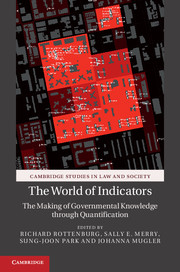Book contents
- Frontmatter
- Contents
- List of figures
- List of tables
- List of abbreviations
- List of contributors
- 1 A world of indicators: The making of governmental knowledge through quantification
- 2 The flight of the indicator
- 3 Narrating numbers
- 4 By their own account: (Quantitative) Accountability, Numerical Reflexivity and the National Prosecuting Authority in South Africa
- 5 Failure by the numbers? Settlement statistics as indicators of state performance in South African land restitution
- 6 Doing the transparent state: Open government data as performance indicators
- 7 Charting the road to eradication: Health facility data and malaria indicator generation in rural Tanzania
- 8 ‘Nobody is going to die’: An ethnography of hope, indicators and improvizations in HIV treatment programmes in Uganda
- 9 Financial indicators and the global financial crash
- 10 New global visions of microfinance: The construction of markets from indicators
- 11 Spirits of neoliberalism: ‘Competitiveness’ and ‘wellbeing’ indicators as rival orders of worth
- 12 Climate change vulnerability indicators: from noise to signal
- 13 Retroaction: how indicators feed back onto quantified actors
- Index
- Cambridge Studies in Law and Society
- References
1 - A world of indicators: The making of governmental knowledge through quantification
Published online by Cambridge University Press: 05 October 2015
- Frontmatter
- Contents
- List of figures
- List of tables
- List of abbreviations
- List of contributors
- 1 A world of indicators: The making of governmental knowledge through quantification
- 2 The flight of the indicator
- 3 Narrating numbers
- 4 By their own account: (Quantitative) Accountability, Numerical Reflexivity and the National Prosecuting Authority in South Africa
- 5 Failure by the numbers? Settlement statistics as indicators of state performance in South African land restitution
- 6 Doing the transparent state: Open government data as performance indicators
- 7 Charting the road to eradication: Health facility data and malaria indicator generation in rural Tanzania
- 8 ‘Nobody is going to die’: An ethnography of hope, indicators and improvizations in HIV treatment programmes in Uganda
- 9 Financial indicators and the global financial crash
- 10 New global visions of microfinance: The construction of markets from indicators
- 11 Spirits of neoliberalism: ‘Competitiveness’ and ‘wellbeing’ indicators as rival orders of worth
- 12 Climate change vulnerability indicators: from noise to signal
- 13 Retroaction: how indicators feed back onto quantified actors
- Index
- Cambridge Studies in Law and Society
- References
Summary
Introduction
Why another contribution to metrology?
There is something new about the use of quantitative knowledge for governing social life in the twenty-first century. In the words of Alain Desrosières in this volume, ‘the recent extension of the use of [such] indicators by New Public Management raises new questions and introduces a discontinuity in the longstanding traditional usage of statistics by governments, which dates back to the eighteenth century’.
From the United Nations’ efforts to improve the statistical capacity of resource-poor countries to local school districts’ penchant for measuring children's achievements in order to evaluate teachers, governance increasingly requires numerical data. Quantitative evidence is seen as essential for developing reasonable policy at local, national and international levels. The promise of evidence-based policy-making is that it is not only more objective and less prone to misuse, but also more transparent, more democratic, and more open to public debate than decisions taken by politicians and business leaders with reference to qualitative forms of knowing. Yet, the creation of these systems is rarely transparent or public. The rapid development and proliferation of more and more sophisticated measurement and quantification systems pose crucial questions about how knowledge produced by measurement and quantification influences the ways we set the norms we wish to follow, the technologies and instruments we regard as indispensable for organising collective life, and the role numeric representation should play in contemporary world orders (Rottenburg 2000; Espeland and Stevens 2008; Heintz 2010; Merry 2011).
The broad field of numeric representation – here used synonymously with quantification and with measurement as the translation of (assumed) realities into numbers – includes various elementary forms of counting and measuring along with several increasingly sophisticated forms of aggregating numbers. As a study in metrology, this book focuses on the making and use of indicators as one of these forms. The word ‘index’ is often used for aggregated indicators but also frequently synonymously with ‘indicator’ and hence refers to the same type of numeric representation. Indicators and indexes used in governance are a particular form of quantification that focuses primarily on finding an answer to policy questions such as: ‘Is our intervention making an impact? Is this the impact we want?’.
- Type
- Chapter
- Information
- The World of IndicatorsThe Making of Governmental Knowledge through Quantification, pp. 1 - 33Publisher: Cambridge University PressPrint publication year: 2015
References
- 39
- Cited by

